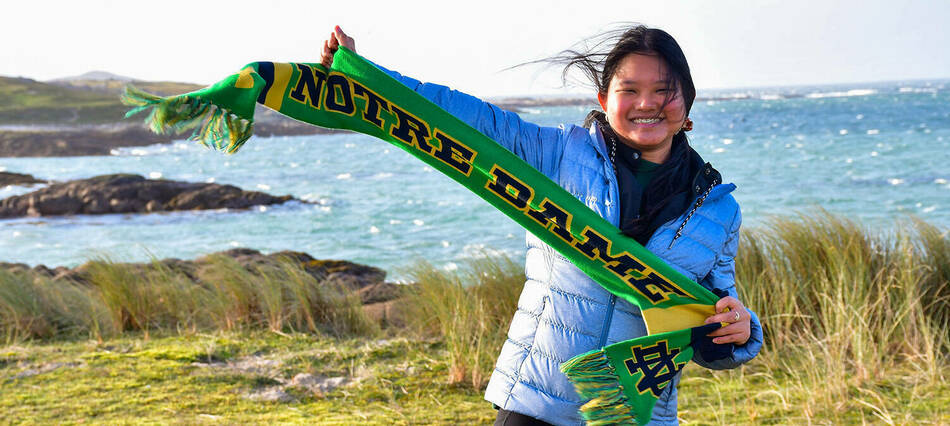Notre Dame ranks second in US for study abroad participation

The University of Notre Dame ranks second in the nation for study abroad participation among doctorate-granting universities, according to the latest Institute of International Education Open Doors report.
This new designation, which ranks Notre Dame second with a participation rate of 77 percent for undergraduate students during 2021-22, recognizes the University’s commitment to global education.
“This recognition serves as a tribute to the University’s commitment to inspiring future leaders to explore and experience other cultures and learn beyond the United States,” said Michael Pippenger, vice president and associate provost for internationalization.
“I am proud of our study abroad team as they continue to create more opportunities for students and encourage students to be intentional in selecting the locations and programs. I am also proud of our students, their intrepid curiosity and willingness to embrace cross-cultural education.”
Notre Dame International’s study abroad office manages more than 60 semester study abroad programs in more than 30 countries around the world. While abroad, students are encouraged to participate in internships, integrate their academics with community engagement and conduct research with leading academics.
Open Doors is conducted by the Institute of International Education with the support of the Bureau of Educational and Cultural Affairs of the U.S. Department of State.
More information on the report can be found here.
Originally published by at international.nd.edu on Nov. 30.
Latest International
- Vatican honors Martin and Carmel Naughton with papal awardThe late Pope Francis, in one of his last acts, conferred the honour of the Order of Saint Gregory the Great upon Carmel and Martin Naughton, Trustee Emeritus of the University of Notre Dame. The papal honor is in recognition of the Naughtons’ outstanding philanthropy in the areas of education and the arts, particularly in the provision of philanthropic support and scholarships to Catholic education at the University of Notre Dame and Kylemore Abbey, and in their transformative contributions to higher education in Ireland.
- Prioritizing prenatal care may decrease low birth weight outcomes in The Gambia, Notre Dame research findsA new study co-authored by University of Notre Dame researchers highlights the importance of prenatal care for improving the health of mothers and newborns, providing evidence that can inform policy.
- Navigating the waters of peace: Researchers address challenges, opportunities in implementation of Colombia's Peace AgreementNearly half of the commitments outlined in Colombia's historic peace accord face significant challenges and may not happen in time unless policymakers make several key interventions, warns a new report from Notre Dame's Peace Accords Matrix. The report offers a blueprint to salvage an accord that has lagged behind its implementation deadlines, putting its legacy at risk. It highlights timely fixes that can strengthen the agreement.
- Partial peace deals may facilitate comprehensive accords, offering roadmap for policymakers, practitionersPartial peace agreements — deals that address targeted issues on the way to larger comprehensive accords — could provide a blueprint for peacebuilding policymakers and practitioners, according to new University of Notre Dame research.
- CANCELED: University to host Cardinal Pedro Barreto of Peru and Cardinal Peter Turkson of Ghana as part of Notre Dame ForumAs part of the 2024-25 Notre Dame Forum, Cardinal Pedro Ricardo Barreto Jimeno, S.J., of Peru and Cardinal Peter Kodwo Appiah Turkson of Ghana will visit the University of Notre Dame to participate in a conversation with President Rev. Robert A. Dowd, C.S.C., at 11:30 a.m. April 25 in the Smith Ballroom of the Morris Inn. The conversation is open to the public and will also be livestreamed for both Spanish-speaking and English-speaking audiences.
- ‘Who the messenger is matters’: Cultural leaders can positively influence population growthFertility rates across the world have been steadily dropping since 1950. Pinpointing the reasons is at the heart of Lakshmi Iyer's work as a professor of economics and global affairs. Her research exemplifies the kind of population-level research that Notre Dame Population Analytics (ND Pop), a new research initiative at the University, seeks to foster.













